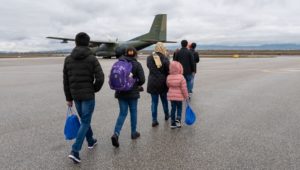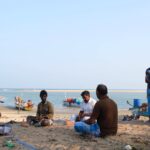This article was published more than 3 years ago.

As the Taliban swept across Afghanistan in August, reimposing their harsh rule after two decades of U.S. occupation, the world was shocked by scenes of desperation and violence at the Kabul airport. But for people forced to flee persecution, arrest, or even death at the hands of the Taliban, their journeys have just begun. While some are still able to leave via the reopened airport, the only option for most refugees are treacherous land routes to Pakistan or Iran. For some, the road is even longer—to India, Turkey, or across the Mediterranean Sea to Europe.
The Fund currently supports 30 organisations focused on the rights of migrant and displaced people, mostly in the Mediterranean Sea region. Many of these nimble groups are now working tirelessly to meet the needs of Afghans arriving in their countries, whilst continuing to respond to the ongoing impacts of COVID-19 and support all vulnerable migrants and refugees in their communities. And our trusted network of relationships across the region have helped us connect with critical emerging initiatives to provide Afghan refugees with pathways to safety. Here are three of the ways grassroots groups are stepping up to support Afghan refugees with our support.
Protecting Afghans in Turkey
Turkey is no stranger to hosting refugees. Nearly 4 million refugees currently live in Turkey—3.2 million are from Syria and approximately 300,000 are Afghan. But that doesn’t mean refugees are always welcome. As thousands of people fled Afghanistan on foot into neighbouring Iran, the Turkish government built a wall on its eastern border to keep them out. And politicians have taken advantage of poor economic conditions to drum up anti-refugee and anti-immigrant sentiments, leading to more backlash and violence.
In response, grassroots groups are mobilising to secure essentials for Afghans who make it to Turkey over the next few months. Activists are gearing up to launch advocacy campaigns in support of more humane and proactive refugee policies, and to help new arrivals secure basics like housing, food, and support with documentation. Groups are also pressuring the government to stop deportations back to Afghanistan, where returnees are likely to face severe punishment or death. The Fund is working to provide emergency assistance that will allow several organisations to do this work.
Helping Reunite Afghan Families in France
In France, the Groupe d’Information et de Soutien des Travailleurs Immigrés (Information and Support Group for Migrant Workers, or GISTI) provides legal aid to migrants and asylum seekers. They also advocate for policies that protect refugees’ rights in France and the European Union. Since the summer, their priority has been helping Afghans already living in France bring their families to safety.
As part of a coalition of asylum organisations, it has drawn up a platform of demands for the French government, which calls not only for visas to be issued to Afghans at risk still in Afghanistan, but also for those who have been able to arrive in France to be taken care of and for asylum seekers whose applications have been rejected not to be deported.
The group also set up robust web tools in several languages to help Afghans in France looking to reunite their families as well as asylum seekers arriving via a third country. They continue to update the site to reflect the latest resources for journalists, women’s rights activists, and families seeking reunification. Going forward, GISTI will continue to provide legal support for Afghans seeking to secure their families’ safety, and to help connect new arrivals with necessary resources.
Taking Action for LGBTQ Refugees
As the Taliban took over Afghanistan, LGBTQ people across the country went into hiding or fled to escape brutal punishments or near-certain death. But for LGBTQ asylum seekers, leaving Afghanistan doesn’t mean escaping persecution—discrimination and physical attacks against LGBTQ people are common in several neighbouring countries, including Pakistan and Iran.
With the Fund’s support, the Aman Project, based in Turkey, is working to support LGBTQ people at risk. Their efforts include helping Afghan LGBTQ asylum seekers evacuate and find safety in countries that offer stronger legal protections for LGBTQ people. For example, they are mobilising French-speaking volunteers to help persecuted LGBTQ people gather and translate documents for their asylum applications with the French embassy.
Their work providing emergency support such as rent assistance and food has been critical for Afghan LGBTQ refugees across the Mediterranean region. Additionally, Aman has also launched a media blitz, securing international stories to raise awareness of the dire situation that LGBTQ Afghans face in Afghanistan. They complement this with public education campaigns to combat homophobia and discrimination throughout the Middle East and North Africa.
The Fund for Global Human Rights is grateful to Comic Relief for their ongoing support of our work with frontline migrant and refugee groups across the Euro Mediterranean region, enabling these groups to sustain and elevate their work and respond to the ongoing impacts of COVID-19 and the Afghanistan crisis.



